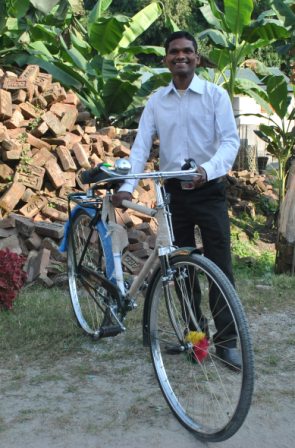|
restoring our biblical and constitutional foundations
|
Introducing the Peniel Gospel Team
The other night I looked up at the sky above our Farm. It was brilliant with stars. The sharp contrast between the dark of the sky and the light of the stars made me dizzy. The stars are there during the daytime, but we can’t see them because the sky isn’t dark. And even in large cities at night, where the lights lighten the sky, it’s often difficult to see the stars.

I thought, “What a beautiful picture of the Peniel Gospel Team!” The spiritual darkness of the country of India, where only 2% claim any relationship with the Savior, makes the brilliance of the Gospel work being done shine all the more brightly!
The coordinating director of this work is a man named Mammen. He describes the ministry of Peniel Gospel Team (PGT): “We are currently working among twenty people groups of the north east region of India. Now we have over the years, some two hundred churches that the evangelists of Peniel Gospel Team have planted over the last forty years. God has been very gracious towards us and helped us to do all that we are doing in this region. We have been working among those people groups where Christ has been never shared.”
Peniel Gospel Team (PGT) is an association of believers in the far northeast corner of India. This location is next to the countries of Nepal, Bhutan and Bangladesh; it is sheltered in the foothills of the great range of Mt. Everest. About 80% of the people in this region are below the poverty line. The believers gather in over 200 local churches. Many of these churches are in isolated, rural villages that are reached only by small paths winding through the hills. Many of the churches are meeting in temporary shelters, with congregations of less than 50 families.
The work was started almost 40 years ago when Mammen, as a new believer from the south of India, was impressed by the Lord to travel north with the Gospel. Like Abraham of old, he left his home and family, travelling to a land that he didn’t know, without financial support or security. After several years of struggling alone in the work, he returned to south India to get a wife. “Alice, I would like for you to be my wife, but let me tell you how it will be. God has appointed me to bring the Gospel to this unreached section of India. We will be alone. We will suffer persecution. We will not have financial security. Our life will be difficult. But we will be obedient. Will you marry me?” (Now, I wasn’t there when he proposed, but I imagine this is how it was J) Alice committed herself equally to the task of Gospel Work, and they returned to settle permanently in this place untouched by the Gospel of Jesus Christ.
After many years of hard work and much sacrifice, God began to bless them with individuals seeking peace for their soul. A person here…a person there….and soon the first church was formed. As the years have passed, the trials and tribulations have continued….but so has the faithfulness of our Lord! Today there are 400 indigenous missionaries working with Mammen; they are taking the Gospel message to totally unreached people groups living off the beaten track.
In addition to these 400 evangelists, PGT has established 2 children’s homes. These homes shelter 110 children, most of whom are orphans. These children are spared much of the poverty and insecurity that would otherwise be their lot as orphans.
In the rural villages, PGT offers free academic education where there are no government schools, or where the people are too poor to pay school fees. Also, PGT offers vocational training, where adults can learn skills to help them make a living. In some villages, they have established wells with good, clean water.
Finally, PGT has established a Bible School/Seminary that trains church leaders and evangelists in the deeper things of the Scriptures.
In all these endeavors, there is one focus: to establish groups of believers, strong in following after Christ.
Can you see the full breadth of this work? Evangelism…rural outreach…orphans…academic education…vocational training…Bible/ministry training…crusades…well drilling. Wherever God opens a door, they use the opportunity to be a shining star for Him.
“How is all this done?” you might be asking. Good question. First, it is done by the grace and blessing of our Lord. Second, it is done by the faithful, sacrificial work of these wonderful Indian brothers and sisters. Third, it is done by good financial stewardship of the love gifts sent by American brothers and sister.
It costs about $75/month to support an evangelist with his family. There are 400 evangelists.
.jpg)
It costs about $35/month to support a child in a children’s home. There are 110 children.
It costs $4,000 to build a temporary shelter for a congregation, and $8,000 to build a permanent shelter. Currently 4 congregations are waiting for a temporary shelter, and 3 congregations are waiting for a permanent shelter.
It costs $1600 for a motorcycle that can navigate the trails to the villages in the mountains; it costs $100 for a bicycle to the villages in the lowlands. Most of the evangelists are still walking to the villages; they are waiting for more efficient transportation.

Add to these items the cost of the Bible School, the free academic schools, the vocational training, administrative expenses…… you get the picture.
Currently 75% of the income needed is coming from outside the country, primarily the USA. (Twenty-five percent comes from donations of the Indian believers and a private school that generates income.) As with all 1st-generation mission work, there is heavy reliance upon outside assistance.
But that assistance comes with trouble. Government sources are naturally interested in any money coming into the country; this requires more government scrutiny of the work. Evangelist and orphan sponsors from abroad are often unreliable; after the initial surge of emotional commitment, their giving slacks off, leaving the Work scrambling to meet the need for food, clothing, shelter and medical care of those placed in their care. Fluctuating exchange rates, changing legislation, and banking fees make international movement of money more costly and unpredictable. The local community surrounding the Work often wonders about the foreign connections of their neighbor; this generates misunderstanding and sometimes hostility. Lastly, voluntary donations are unpredictable, making financial stewardship in the Work more difficult.
Into this situation God has brought our partnership.
(Next: Defining our Partnership.)
February 15, 2013